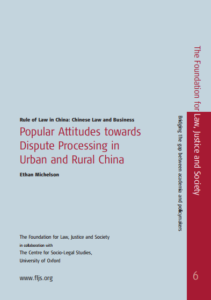Popular Attitudes towards Dispute Processing in Urban and Rural China
By: Ethan Michelson, Foundation for Law, Justice and Society
Decades of research in the field of law and society reveals the fallacy of conflating the ‘legal’ and the ‘justice’ systems. Law is but one means, far from the most important means, of resolving disputes and obtaining justice. Moreover, law is far more than official state law, including also unofficial customary law. The simultaneous existence of multiple, overlapping, and competing legal and law-like systems is known as ‘legal pluralism’. All over the world, courts, police, and lawyers, a convenient definition of the legal system I adopt for purposes here, represent merely the tip of the proverbial iceberg, an important but relatively small part of the larger justice system: the full landscape of dispute processing.
This policy brief assesses the relative popularity and performance of different means of dispute processing in different parts of the justice system in China. By identifying what does and does not work under what circumstances, my goal is to inform the development of policies for improving access to and the delivery of justice for some of China’s most needy citizens.

